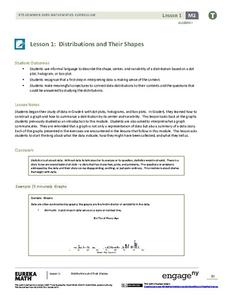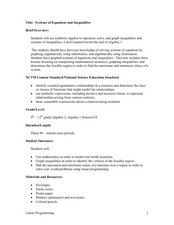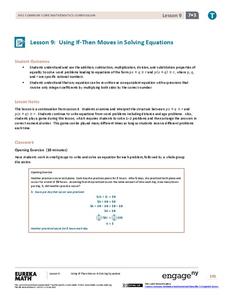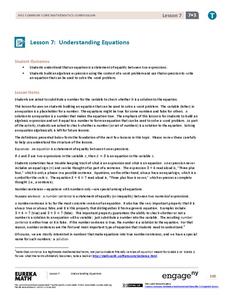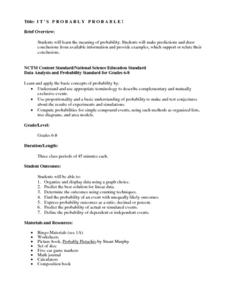EngageNY
Solving Equations Using Algebra
Use a tape diagram to emulate the steps of solving equations. The 23rd installment in a 25-part unit presents two-step linear equation problems to solve. Pupils use tape diagrams to solve the problems along with linear equations. To...
Curated OER
Interpreting Algebraic Expressions
Interpreting algebraic expressions is a fundamental skill in beginning algebra. This instructional activity approaches the task in numerous ways. First, learners assess their understanding with a short worksheet on converting between...
EngageNY
Solving Equations Using Algebra 2
If you use a fabulous lesson plan, then your pupils can become fabulous at solving equations. The 24th installment of 25 incorporates the use of if-then statements to illustrate the properties of equality used in solving two-step linear...
Newspaper Association of America
Power Pack: Lessons in Civics, Math, and Fine Arts
Newspaper in Education (NIE) Week honors the contributions of the newspaper and is celebrated in the resource within a civics, mathematics, and fine arts setting. The resource represents every grade from 3rd to 12th with questions...
EngageNY
Comparing Tape Diagram Solutions to Algebraic Solutions
Learners solve vacation equations using tape in a lesson plan that utilizes tape diagrams to aid in understanding the algebraic steps involved in solving two-step linear equations. Groups work together to solve seven scenarios involving...
EngageNY
Writing, Evaluating, and Finding Equivalent Expressions with Rational Numbers 2
The 20th segment in a series of 25 has learners work with percentage problems to generate equivalent expressions. Pupils find discounted prices using numerical and algebraic expressions. The task then requires individuals to find the...
Delaware Math Cadre Elementary Committee
Operations and Algebraic Thinking
How to use the relationship between multiplication and division to solve math word problems is the focus of the instructional activity presented here. In it, fourth graders work in groups to solve problems posed by the teacher. Then,...
Curated OER
The Math Things Mingle
Even Seveth Graders can have fun engaging in a jigsaw activity. They discuss and define equations, inequalities, expressions, and algebraic symbol strings, cards representing each concept are passed to learners. They mingle with each...
West Contra Costa Unified School District
Simplify Expressions and Solve Equations Using Two-Column Proofs
Increase understanding of the algebraic properties and their importance. Scholars justify their steps as they simplify expressions and solve equations. They formalize their work as two-column proof.
EngageNY
Distributions and Their Shapes
What can we find out about the data from the way it is shaped? Looking at displays that are familiar from previous grades, the class forms meaningful conjectures based upon the context of the data. The introductory lesson to...
National Security Agency
Systems of Equations and Inequalities
High school classes can use manipulatives too! Offer hands-on, interactive lessons that venture away from the typical day in your algebra class. Young mathematicians will be involved in collaborative learning, visual...
EngageNY
Angle Problems and Solving Equations II
Demonstrate the application of algebra to geometric angle relationships with an activity that asks learners to use what they know about adjacent and vertical angles to write algebraic equations. Diagrams become more complex in this...
Kentucky Department of Education
Multiplication Grade 3 Formative Assessment Lesson
Guide multiplication lesson plan instruction with a formative assessment. Mathematicians are given two multiplication problems to solve and represent using the area model, equal groups, repeated addition, and word problems. Following the...
EngageNY
Collecting Rational Number Like Terms
Teach pupils to handle fractions fluently. The sixth installment in the series of 28 has class members apply the concepts learned in previous lessons to expressions with fractional coefficients. The fractions are both mixed numbers and...
EngageNY
Solving Inequalities
Investigate complex problem situations by applying inequalities. Building from concepts explored in the previous lesson plan, learners read word problems and develop inequalities to represent the situation. They then solve the...
EngageNY
Using If-Then Moves in Solving Equations II
Continuing from the previous lesson in the 28-part series, learners write equations to model problem situations. They then solve the problem by applying the properties of equality. In contrast to the previous lesson, they do not write...
EngageNY
Understanding Equations
After examining expressions in the first six lessons of the series, learners are now ready to apply those concepts to create equations in the seventh installment of 28. Each exercise contains a conceptual situation that helps build an...
Math Solutions
Dr. Seuss Comes to Middle School Math Class
If you think Dr. Seuss has no place in a math classroom, then take a look at this resource. Based on the classic children's book Green Eggs and Ham, this sequence of activities engages children learning to model real-world contexts...
EngageNY
Complementary and Supplementary Angles
Connect algebraic and geometric concepts to solve problems. The first instructional activity in the 29-part series examines complementary and supplementary angle relationships. Scholars write equations to represent the relationships and...
National Security Agency
It's Probably Probable
Learners make predictions and draw conclusions from given information as they learn the meaning of probability in this vocabulary-rich, integrated activity that presents a variety of teaching strategies to motivate and reach...
ConnectED
Crime Scene Investigation
How exactly does a crime scene investigation work? The resource, a unit on criminology, covers everything from the deductive reasoning skills needed for detectives to DNA fingerprinting, all the way to how to gather evidence and bring...
Curated OER
Monster Frog Function Machine
Elementary schoolers use a function machine in order to help them look at the relationship between input and output, and to look at the rule for the change. The machine is actually a cardboard box, and it serves quite well for the lesson...
Curated OER
My Foot and the Standard Foot
Young mathematicians put one foot in front of the other as they learn how to measure length in an elementary math lesson. Using paper cutouts of their own feet, children measure classroom objects as they discover the importance of...
EngageNY
Writing Equations Using Symbols
Build upon prior equation writing experience to create more complicated equations. Lesson one in a 33-part unit builds upon the class members' sixth and seventh grade experience of writing linear equations. Several examples...









